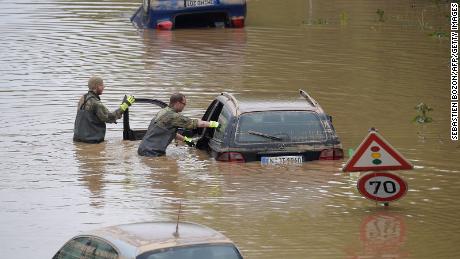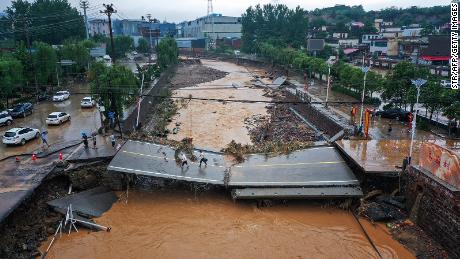Europe floods: Scale of destruction revealed as water subsides

(CNN)A week after severe flooding hit western Europe, devastating Germany, Belgium and the Netherlands, German officials said Thursday they fear the 158 people still missing there may not be found.
The death toll from the floods has risen to at least 205 across the continent, while a total of at least 176 people remain accounted for. Belgium accounts for 32 deaths and 18 missing, according to its national crisis center.
In Germany, the hardest-hit country, entire towns were inundated by water, while train lines and roads were swept away by the flash floods, claiming at least 173 lives.
Germany’s federal disaster relief organization said it was very unlikely that any more survivors would be found. Rescue services have continued to comb through towns ravaged by the floods in search for potential survivors.
The vice president of Germany’s federal agency for technical relief, Sabine Lackner, also told CNN Thursday that she did not expect emergency workers to find anymore survivors.
“The search for missing people continues to move forward, but due to the damage scenario and the time that has now passed, there is little hope that missing people will be found at this time,” Lackner said in a statement.
In the city of Koblenz, in the badly hit western German state of Rhineland-Palatinate, police said at least 125 people were now confirmed to have died. ”There are still 155 people unaccounted for,” police spokeswoman Verena Scheurer told CNN Thursday, adding that “therefore, we presume at this stage that the number of deaths could still rise.”
On a visit to the state on Sunday, German chancellor Angela Merkel said the devastation was “surreal,” adding: “I can almost say that the German language doesn’t have words for the devastation.”
At least 47 people have died in Germany’s most populous state of North Rhine-Westphalia, according to a statement by the Interior Ministry. The ministry revised the number down from previously 48 deaths to 47 deaths on Thursday.
The state premier, Armin Laschet, who is also the Conservatives’ candidate to succeed Merkel in the upcoming federal election, said the floods were “a catastrophe of historic proportion” for the state, and called on the world to speed up its efforts to both fight and adapt to climate change.
Max Wilmes, police spokesman in Cologne told CNN Thursday that at least three people in the district of Euskirchen remain unaccounted for. Authorities in Upper Bavaria told CNN Monday that at least one person died following torrential rainfalls over the weekend.
Experts say freak weather events like the floods and the recent heatwave and wildfires across Canada and the US are a sign of the impacts of climate change.
“We’re at a point where everyone on the planet now has felt the impacts of climate change itself, or at least someone they love or know has. It’s circling in closer and closer,” director at the Institute of Arctic and Alpine Research Merritt Turetsky told CNN.
In the Netherlands, which has recorded no fatalities, an excellent water management system and better preparation by officials meant the country was able to deal with the floods much better than its German and Belgian neighbors. However, tens of thousands of people still had to be evacuated.
German weather service spokesman Andreas Friedrich, who told CNN a week ago that Germany had “not seen this much rainfall in 100 years” in parts of western Germany, warned that more rain is forecast in some of the flood-ridden areas this weekend.
“Some heavy rains and thunderstorms are expected to hit western Germany over the weekend, particularly on Saturday. However, under no circumstances should we see flash floods we have seen and experienced a week ago,” Friedrich told CNN on Thursday.
“The severe weather will be local and short term, like a normal summer thunderstorm. There could be storms, hailstones or heavy rain for a short time, but we won’t see two days of continuous rain.”
Source: Read Full Article















































































